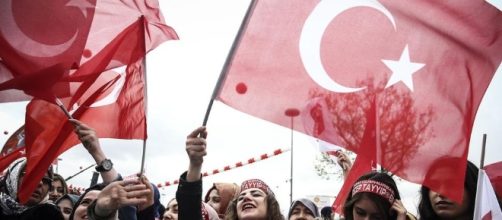As predicted, Turkey voted for the constitutional changes and introduction of a Presidential System that will replace current parliamentary type democratic rule. More than 95 percent of ballots are counted, and 'Yes' votes lead with just more than 51 percent. The Turkish secular opposition, headed by the Republican People's Party (CHP), requests recounting of votes, as they suspect some election frauds.
Yes to the powerful Presidency
Figures from vote counts showed 'Yes' on 51,70 percent (23,997,153 votes), while 'No' had 48,30percentt (22,420,313 votes); Ankara, Istanbul, and Izmir, three biggest Turkish cities, overwhelmingly voted against the referendum position and change of the political system that will replace the Office of Prime Minister with that of executive president with enormous rights.
Turkish president Recep Tayyip Erdogan celebrates, as this was his long-time dream. Together with him rejoices the ruling Justine and Development Party (AKP) with its leader and Prime Minister (who will seize to exist) Binali Yildirim, but also the Nationalist Movement Party (MHP) and its leader Devlet Bahceli, and Grand Unity Party (BBP) with Mustafa Destici.
What will change now? Practically, nothing. Up until now Erdogan showed that the political institutions mean nothing for the position of power. The power follows Erdogan, either as Prime Minister or as the President. He just succeeded in legalising this position by changing the jurisdiction to make practical things easier. If he didn't succeed in the referendum, Erdogan would have challenged it again – and continue to rule as he did up until now.
For his opposition, this is a crushing defeat as the 'Ye's vote gives the full control of the party to a single man who could act according to the AKP's expectations.
Authoritarian rule and capital punishment
For Turkey, this means beginning of a tremendous polarisation and more authoritarian rule, under the pretext of 'popular will.' Erdogan, as a master populist, always declares his will to be the will of the people, and in the new circumstances it will be more efficient; practically the answer to all the problems and challenges the country is facing at home and abroad.
The Prime Ministerial position and role of government in the parliamentary system is simply too slow for Erdogan and practically inefficient. But that is just plain lie – the executive Presidency has no checks-and-balances, as the proposed bill gives him the possibilities to issue executive orders with the force of law, to abrogate the parliament; to appoint judges.
He can intervene in the national budget, and stop legislations.
In fact, it is widely expected that Turkey will bring back capital punishment very soon, to which most parties except AKP are against. The death sentence was abolished in 2004, although no prisoner has been executed since 1984. This was done because of the European Accession negotiations, as the European Union forbids capital punishment within its members. It also signals Erdogan's strong decision not to continue negotiations with Brussels and orient itself more to the Shanghai Cooperation Organisation, a group of countries with the same iliberal democracy, strong presidential rule, and authoritative political culture. Here Erdogan feels at home, without any pressure regarding human and civil rights. Indeed, the 'Yes' vote brings back traditional autocracy akin to the historical Turkish political culture.

